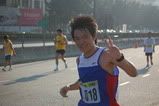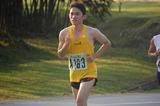Nutrition for Marathon Runners
Below:
•
How much fluid do I need?
•
Should I drink water or a sports drink?
•
What type of food is best for energy?
•
How soon can I eat before training?
Good nutrition should form an important component of your preparation for running a marathon. Just as you will plan aspects of your training such as increasing your distance training and improving your training time you will also need to plan your diet carefully. How much fluid do I need?It is important to be well hydrated before, during and after training. The best way to ensure this is to drink early and often.
When you exercise, your body looses water through sweating and through vapour on your breath. If this water is not replaced you will become dehydrated. Even a slight amount of dehydration can have negative effects: your body will not be able to regulate your core temperature and you will overheat, you may also experience nausea and light headedness. Left unchecked dehydration can lead to collapse.
The amount of fluid you need depends on the length of time you spend exercising, the intensity of your exercise and the weather. Studies show that many athletes drink only about half the volume they need. In general, you should aim to drink 150ml-200ml every 15 minutes during exercise. However, if it is a hot day or your exercise route is hilly (higher intensity) you will need to drink more.
Should I drink water or a sports drink?
The energy needed to run a marathon exceeds the amount of energy stored as carbohydrate (CHO) in the body. Carbohydrate, fat and protein stores will all help to keep you going during the marathon itself but carbohydrate is the most efficient at providing energy. Following a high carbohydrate diet all during the training period will help expand your body stores of carbohydrate, but these stores alone will not last the entire marathon event. It is important therefore that you drink an isotonic sports drink during training and during the marathon itself.
These drinks contain carbohydrate and will help to supplement your energy needs and avoid fatigue during the race. They can be bought in most shops and supermarkets. Popular brands include Powerade, Gatorade and Lucozade Sport. Alternatively, you can make your own by mixing 200ml squash/cordial with 800ml water and 1g (pinch) table salt.
Recent studies show that sipping isotonic drinks during exercise also helps to protect the immune system. This is good news for athletes who, in general, are more susceptible to infection than non-athletes because of what is described as an 'open window' of impaired immunity that follows heavy or prolonged exercise. The 'window' may be open for between 3-72 hours after exercise.
The early weeks, as you build up your training distances, are a good time to practice drinking during training. Find a sports drink that you like the taste of. Experiment with different brands and homemade versions of drinks until you find one you like. Also, it is easier to drink a cool rather than a very cold drink so it is a good idea to take your fluid bottle out of the fridge an hour before you start training.
Drinks should not contain caffeine or alcohol. Avoid carbonated/fizzy drinks also as they tend to cause gastric upset.
What type of food is best for energy?
Carbohydrate (CHO) is the most efficient form of energy and all athletes are recommended to follow a high carbohydrate diet. Carbohydrate-rich foods include bread, crackers and bagels; pasta, noodles, rice and couscous; breakfast cereals; fruit and milk.
The longer you spend training the more carbohydrate you need. The table below will help you calculate your daily carbohydrate needs.
Duration of Training
CHO needs
1-2 hours/day
6-7g CHO/Kg body weight/day
2-4 hours/day
7-8g CHO/Kg body weight/day
4+ hours/day
8-10g CHO/Kg body weight/day
So, if you weigh 68kg when you begin training, you should be eating 408g CHO every day. This should be spread throughout the day. For example, aim to eat 100g CHO with each main meal (breakfast, lunch and dinner), 50g CHO as a snack two hours before training and a 50g CHO snack directly after training.
For example, to reach the 100g carbohydrate target at main meals, include any two of the following foods or drinks at every meal:
•
Breakfast cereal, milk and sugar (large bowl);
•
Toast (4 slices);
•
Sandwich/roll (2 rounds of sandwiches or demi-baguette);
•
Pasta-based meal like spaghetti bolognaise or lasagne;
•
Potatoes (2 large, baked);
•
Rice (4 serving spoons);
•
Noodles (400g);
•
Soft Tortillas (flour tortilla wraps);
•
Fruit juice (500ml);
•
Apple/banana/orange;
•
Fruit yoghurt/yoghurt drink (2 pots);
•
2 pints milk.
If you are finding it difficult to eat the large amounts of carbohydrate recommended for sport, sports drinks, some of which contain up to 50g CHO per can will help meet your carbohydrate needs. Sweets and confectionery bars also have a high carbohydrate content and can be used occasionally to top up your daily carbohydrate intake.
The following foods contain 50g CHO and will be helpful as snacks between meals to help top up your carbohydrate needs:
•
2 crusty bread rolls;
•
4 slices toast;
•
6 jaffa cakes;
•
Large bowl of cereal;
•
5 fig rolls;
•
1 Mars bar;
•
2 cans Lucozade Sport;
•
1 can of Gatorade NRG.
How soon can I eat before training?
Eating the right foods in the right quantities will help you build up your energy stores and fight fatigue. However, it is also important to eat at the right times. Aim to eat a high carbohydrate meal 2-4 hours before training and pack a carbohydrate-rich snack or sandwich and a drink in your kit bag to eat immediately after exercise.
AuthorNuala Collins,BSc. Human Nutrition, Dip Dietetics and Nutrition, Cert Allergy, Accreditated Sports Dietitian







No comments:
Post a Comment